Shock and Aw: Getting Over the Sins of ’98
This just in: With all forgiven, Mark McGwire makes Hall of Fame. Who knows, it may even happen in his lifetime.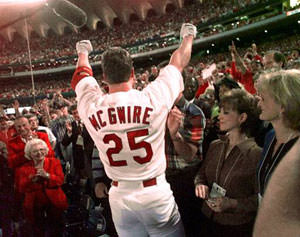
Editor’s note: Listen to a related podcast with Mark Heisler here.
This just in: With all forgiven, Mark McGwire makes Hall of Fame.
Who knows, it may even happen in his lifetime.
It’s nice to know that as nuts as the world gets now, it still can’t stay mad forever at someone who admits his mistake.
Of course, in Big Mac’s case, the world looks like it may still be upset for another 10 years, or until sports writers, who grew up on The Game’s Continuity With Its Past, are succeeded by enough people who grew up following the game on their iPhones.
This isn’t the world, this is baseball.
The Hero is now an embarrassment to The Game, a living embodiment of the steroid era, which revealed its inability to confront what everyone in it knew was happening.
Whatever you prefer to believe, you’ll never know what you’d have done in McGwire’s place, with his career going downhill — whether because of injuries, as he believes, or a hole the size of a beach ball in his swing — grabbing onto substances that weren’t against baseball rules, erring technically only in not getting a prescription, which would have been easy, sealing his fate by then going to a new, mythic level that made it impossible for him to acknowledge how he had done it.
Worst of all, the thing that no one can forgive him for, McGwire broke baseball’s heart, as players, writers and league officials alike set aside their skepticism to join the revelry in the national Mardi Gras known as the Summer of ’98.
There were, indeed, reasons to be skeptical about McGwire’s confession, starting with the timing — nine years after he retired, five after his reputation went down in flames in the time it took to say to Congress “I’m not here to talk about the past.”
Then there was Ari Fleischer, who orchestrated the confession. The former presidential press secretary stayed in the background on this one, as opposed to the times he asserted limits on free speech after 9/11 (“There are reminders to all Americans that they need to watch what they say, watch what they do”), or laid down the case for the Iraq war (“There is no question that we have evidence and information that Iraq has weapons of mass destruction, biological and chemical particularly.”)
As detailed by The New York Times’ Richard Sandomir, Fleischer’s rollout could serve as a model for future confessions.
McGwire’s apology was first released to the wires for instantaneous worldwide distribution, then fleshed out in a sitdown with the MLB Network’s Bob Costas, who would ask all the hard questions credibility required.
McGwire, who was media-shy when he was on top, then told and retold his story for two days so the media heavies, like ESPN’s Bob Ley, each got “exclusives” to trumpet.
It worked for McGwire, who, for the first time since his fall, was entirely human.
Only Howard Beale’s humanoids from the movie “Network” wouldn’t have been moved as McGwire, choking back sobs, apologized to everyone—“major league baseball, my family, the Marises, Bud Selig,” adding in a quavering voice, “Today was the hardest day in my life.”
Even if you didn’t buy his whole argument — and no one could — there was no mistaking what he was going through after shutting himself off from the world for years because he couldn’t say those very words.
“Mark McGwire did himself a lot of good, he did,” acknowledged a skeptical Mike Lupica of the New York Daily News, adding, “It was painful to watch as McGwire broke down time and again.”
Of course, you don’t want to underestimate the number of humanoids out there.
“What McGwire has suffered and I can say it straight to Mark’s face, is nothing, not even remote to what I suffered, and he sits there and starts crying,” said Jose Canseco, the original cheater/tell-all author.
“Mark, there’s no crying in baseball, you know that. You’re being taken care of and you know it as well as I do.”
Pre-steroid-era greats all but vowed to lie down before the gates of Cooperstown to keep McGwire from being enshrined among players of character, like themselves.
“What does the Hall of Fame consist of?” asked Goose Gossage, the old fireballing reliever with the extravagant Fu Manchu mustache.
“Integrity. Cheating is not part of integrity. …
“It bothers me that we always talk about those guys and we seem to forget about the guys who didn’t cheat. They get penalized twice. They don’t make as much money, and when it comes to the Hall of Fame, their numbers are going to pale in comparison to the other guys.”
Even if Goose meant “we” get penalized twice, and leaving out the part about no one talking about him and his making less money, that leaves the laughable Hall of Fame Integrity argument.
Baseball’s Continuity With Its Past is really a continuity with the good parts, even if they must be sanitized, like Commissioner Kenesaw Mountain Landis reinstating Ty Cobb and Tris Speaker, who had been forced to retire by American League President Ban Johnson after pitcher Dutch Leonard said the three of them bet on a game they knew was fixed.
Leonard furnished documents seeming to support his story, but refused to testify publicly, giving Landis cover to reinstate Cobb and Speaker.
That was l-o-n-g ago, when things were routinely covered up, or ignored, like Babe Ruth’s drinking.
Of course, the press back then didn’t do a song and dance over “character,” either, knowing how much or how little there was.
Great writers of the day cheerily acknowledged they were out to create myths to give the public what it wanted and promote the game.
Outlined against a blue-gray October sky, the Four Horsemen rode again. …
Grantland Rice crafted the most famous line in sports writing from the Polo Grounds press box, from whence he could only see the Notre Dame backfield that outlined the ground.Nor did Rice go downstairs and get the idea about riding across the sky from Harry Stuhldreher, Don Miller, Jim Crowley or Elmer Layden, although in this case the Apocalypse was only a game against Army.
Writers then didn’t go downstairs after games. If poetry was what they were after, they could do it better themselves.
Today with the press fighting with bloggers, tweeters and TMZ just to be noticed, the game is left to fend for itself and everyone happily shreds myths as fast as they create them, since both sell.
Surprising as it was, at least to me, there was no sympathetic reaction to McGwire’s heart-rending performance, just more carping.
Unfortunately, when Fleischer briefed McGwire on what questions to expect, Ari apparently forgot to provide an answer or two.
Asked by Costas if the steroids accounted for his home run exploits —duh — McGwire said, over and over, that he did that part by himself.
“No pill or injection is going to do that,” McGwire told Costas, who needed all his poise to hide his shock.
“I was given this gift by The Man Upstairs. My track record as far as hitting home runs, my first at-bat in Little League was a home run.
“They still talk about the home runs in high school, they still talk about the home runs in [American] Legion, they still talk about the home runs I hit in college. I led the nation in home runs [at USC]. They still talk about the home runs I hit in the minor leagues.”
As McGwire’s core audience knew, to the decimal point, if The Man Upstairs gave him that gift, he left out the one for singles and doubles.
After hitting .289 with 49 home runs as a rookie, McGwire fell into the .230s in his third and fourth seasons before his swan dive to .201 in his fifth when he hit 22 homers and only 75 singles, double and triples.
McGwire said that was because of the injuries, which obliged him to take the ’roids, which restored him to his natural superstar self.
Of course, there was only one reason he could say something so self-defeating: He believes it with all his heart and soul.
In other words, he’s I-N D-E-N-I-A-L.
Like, that’s supposed to count against him, too?
If forgoing denial is the new standard and The Man Upstairs gets to decide, McGwire won’t ever go into the Hall of Fame and no one else will, either.
You don’t have to have climbed to the mountaintop and tumbled into the Valley of the Lepers to be in denial. I don’t know anyone who isn’t, and none of my friends has been a worldwide disgrace, even if they — OK, we — had an embarrassing moment here or there.
Do you think Elizabeth Hurley or Jamie Lynn Spears look cool?
Sit down, take a pamphlet and we’ll get to you.
Denial is an exponentially more powerful mechanism for professional athletes, who wouldn’t be professional athletes if they couldn’t surmount negative input, like being cut, booed or seeing their average make a five-year march from .289 to .201.
It’s especially true in baseball, a team sport that’s nevertheless a celebration of the rugged individual, which may have something to do with its appeal in our capitalist, social Darwinist culture.
A hitter goes to bat by himself, his face recognizable to all in the stands looming over him, to face 98-mph heat and, as Crash Davis noted, ungodly breaking stuff with the bottom falling out.
Aside from the occasional tip on what pitch is coming—which helps, even if Nolan Ryan occasionally told hitters like Reggie Jackson what was coming, to see who was better—the batter is as much on his own as he was the day he popped into the world and will be the day he dies.
Denial is the lifeblood of baseball, exemplified by the old story I heard from Don Drysdale, the great right-hander, himself:
“The ballplayer is walking down the street with his girlfriend when he runs into his wife.
“ ‘Who are you going to believe,’ he tells his wife, ‘me or your eyes?’ ”
At the zenith is the illusion you’re a superman, or The Superman, projected by no one else like baseball stars with their sheer, preening, you-are-not-on-my-level-or-a-recognized-part-of-my-world aura.
I still remember Willie Mays sauntering across the field before a game, his cap tilted down over his eyes, his glove dangling by his fingertips, secure in the knowledge all this was his.
In the way of baseball, a culture that’s verbal only in the press box, Mays didn’t like talking to the press but didn’t have to. His mere bearing was expressive enough, saying all there was to say about who he was and where that left you, whether you were Warren Spahn or a utility infielder.
Baseball players strive for that state, as Buddhists aspire to Nirvana. Covering the Angels in the ’70s, I remember Manager Jim Fregosi marveling at Boston’s Jim Rice, strolling regally to the cage in batting practice in Fenway Park, as if Rice’s bearing was the reason he hit the way he did — which, to a great extent, it was.
So, yeah, you bet your ass McGwire has denial mechanisms that could derail a locomotive.
Understandable as that should have been, all that was sympathetic in his confession was eclipsed by the little that wasn’t.In an MLB Network panel discussion after the Costas interview with several of the best and brightest baseball writers, such as Sports Illustrated’s Tom Verducci and Fox’s Ken Rosenthal, all were struck by McGwire’s stubborn claim to greatness-despite-steroids.
“I think people want to forgive Mark McGwire,” insisted Costas, who does sympathize. “Not excuse it. Not say it didn’t matter. Not vote for him for the Hall of Fame, but say ‘Yeah, he’s a decent guy and he deserves another chapter in his baseball life.’ ”
“But do I think that most people who reside on this planet believe that he didn’t get a substantial performance-enhancing benefit from using steroids?
“I think people are more than skeptical about it. I think they pretty close to reject it out of hand.”
If that shouldn’t matter, but does — in a big way — there’s something else working: the anger of baseball’s establishment, which bought the fairy tale of the Summer of ’98 like 5-year-olds lined up to see Santa.
Notable figures like ESPN’s Buster Olney have been gracious enough to acknowledge the regret they feel for their role, but that’s far from the majority response.
The real story of what happened is more complicated and still only dimly understood.
The press wasn’t really complicit, so much as helpless.
Steroid use was common knowledge, but unless players owned up — which happened several times, as in Ken Caminiti’s Sports Illustrated cover story — you couldn’t write about it because you couldn’t prove it.
If you tried, you exposed yourself to grief, as in the case of The Washington Post’s Tom Boswell, who, in 1988, called Canseco “the most conspicuous example of a player who has made himself great with steroids.”
Canseco did a blanket denial, leaving Boswell to acknowledge he had no proof, and was subsequently voted that season’s MVP — by the writers.
The same was true for Bud Selig, the commissioner who was only nominally in charge. The real power lay with the union after the strike that canceled the 1994 World Series, a nightmare Selig’s owners would never dare repeat.
If the buck had to stop somewhere, it was on the desk of Don Fehr, the bland, tenacious director of the Major League Baseball Players Association.
After decades of battle with the owners, who hated the union and tried to break it time after time, the players association had become a superb fighting force that was leery of laying down its weapons, like Israel.
Fehr refused to allow testing, protecting his players from the owners, instead of their real problem, each other. If the press wants to feel bad about something, it should be for letting responsibility fall on Selig, the amiable doofus, while giving Fehr a pass, which was helpful for staying on good terms with the players.
In the part that really hurts, the Summer of ’98 touched something deep in a lot of grown-ups, even writers who had seen it all, like the Daily News’ Lupica, who wrote a book about the joy he found in sharing it day by day with his father and his children.
No one expressed it more clearly than SI’s Gary Smith, our Marlon Brando, who brought method acting to sports writing, working less, digging deeper and feeling more than the rest of us put together.
After throwing himself into the actual event as it unfolded, Smith later wrote the SI essay proclaiming McGwire and Sammy Sosa SI’s Sportsmen of the Year.
Mac and Sammy were on the cover, dressed in togas, with laurel wreaths on their heads. Really.
“We didn’t even sit down,” wrote Smith. “It was automatic. It was unanimous. It was the easiest selection in our history. It couldn’t be one sportsman of the year.
“It had to be two. … [Mark McGwire and Sammy Sosa] gave America a summer that won’t be forgotten: a summer of stroke and counterstroke, of packed houses and curtain calls, of rivals embracing and gloves in the bleachers and adults turned into kids—the Summer of Long Balls and Love.”
After McGwire’s tragic fall/congressional testimony, Smith wrote a 7,700-word retrospective/mea culpa, that included this passage:
I dial a Catholic priest. Someone who knows what happens when an institution holds its silence as the cesspool rises. Someone who has seen the cost when loyalty to the brotherhood somehow becomes the higher law, more important than even, say, the life of a kid.
Father Jim MacDonald, a 65-year-old Giants season-ticket holder, sits in the upper deck behind home plate. The perfect perch for the spectacle of a Barry Bonds bomb. … But what does the kindly curate do now?
“I do not know that he [Bonds] took steroids, ” he says.
But, Father, even if you just take what he said in his grand jury testimony—
“They claim Babe Ruth drank a lot of whiskey.”
But whiskey wouldn’t help him hit a baseball farther, Father. In fact, it would probably—
“I don’t know the medical effects of steroids. They do not increase bat speed from what I know. …”
But as a matter of fairness, Father—
“I haven’t thought about fairness.”
So even as a priest, you—
“As a priest I recognize that people are human and make mistakes.”
So then you do realize, Father, that—
“Look. You’re talking to a fan. An irrational Giants fan. I’m sad for Barry if he did it. But I still think he’s a wonderful baseball player.”
It’s only sports, it’s not the least bit rational, just the hope the home team wins.
The home run record, as ESPN’s Tim Kurkjian noted, “is only a line in a book.”
If you thought McGwire was an epic figure, as opposed to a guy like you and me, who was out to get as much as he could and stave off the day it ended and hit a lot of home runs in 1998, majestic as they were, that’s on you.
They say sports teaches values, but here’s one that gets left out:
Compassion.
Your support matters…Independent journalism is under threat and overshadowed by heavily funded mainstream media.
You can help level the playing field. Become a member.
Your tax-deductible contribution keeps us digging beneath the headlines to give you thought-provoking, investigative reporting and analysis that unearths what's really happening- without compromise.
Give today to support our courageous, independent journalists.
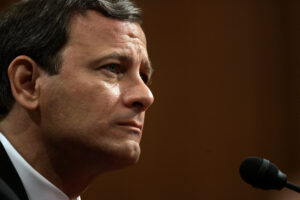
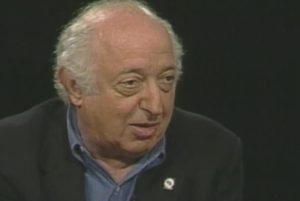
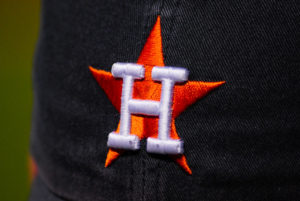

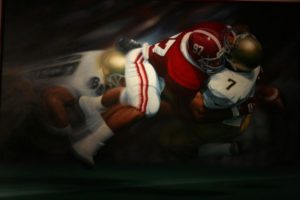
You need to be a supporter to comment.
There are currently no responses to this article.
Be the first to respond.